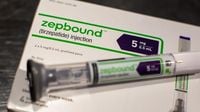Eli Lilly's stock soared on April 17, 2025, following the announcement of promising results from its Phase 3 clinical trial for orforglipron, a once-daily oral medication aimed at treating obesity and Type 2 diabetes. This new pill, if approved, could serve as a significant alternative to the current injectable GLP-1 medications, which have gained popularity but also faced limitations due to their delivery method.
The trial results revealed that orforglipron delivered an impressive weight loss of up to 7.6% in diabetes patients over a 40-week period, compared to a mere 1.7% in those receiving a placebo. Notably, participants taking the highest dose of the medication lost an average of 16 pounds, and many were still losing weight when the trial concluded. Furthermore, the drug also significantly reduced blood sugar levels, lowering A1C by an average of 1.3% to 1.6% from a baseline of 8.0%.
"We are pleased to see that our latest incretin medicine meets our expectations for safety and tolerability, glucose control, and weight loss," said David Ricks, Eli Lilly's chair and CEO, in a statement. He expressed confidence in the drug's potential, stating that orforglipron could be "readily manufactured and launched at scale for use by people around the world." This sentiment was echoed by health industry consultant Marianne Udow-Phillips, who highlighted the demand for a pill version, noting, "It would be so much easier for people to take than using the injection."
Currently, GLP-1 treatments can cost up to $1,349 per month without insurance, which presents a barrier for many potential users. Analysts predict that if orforglipron is priced lower than its injectable counterparts, it could lead to broader coverage by employers and insurance providers. Bank of America analyst Tim Anderson projected that the new pill could generate $10 billion in sales by 2030, underscoring the financial stakes involved.
However, the path to market is not guaranteed. Eli Lilly plans to submit orforglipron to the U.S. Food and Drug Administration (FDA) for approval as a treatment for Type 2 diabetes in 2026, with a request for weight management approval expected by the end of 2025. The FDA's review process could take several months, and uncertainties remain regarding the drug's availability in the U.S.
Additionally, the clinical trial results come amid a backdrop of concerns in the pharmaceutical industry. Pfizer recently announced it would discontinue its development of an oral GLP-1 drug after a patient suffered a liver injury that may have been linked to the treatment. In contrast, Eli Lilly reported no signs of liver-related safety issues associated with orforglipron, which could bolster its case for approval.
During the trial, the most common side effects reported were mild to moderate gastrointestinal issues, including diarrhea, nausea, and vomiting, which align with the side effects seen in injectable GLP-1 medications. The company noted that different doses of orforglipron produced varying rates of side effects, but overall, the safety profile appeared favorable.
The potential impact of orforglipron extends beyond individual health benefits; it could also reshape the market for GLP-1 drugs. With the current injectable options like Eli Lilly's Zepbound and Mounjaro, and Novo Nordisk's Ozempic and Wegovy, the introduction of an effective oral medication could significantly broaden the user base. Analysts suggest that while some patients may prefer injections, the convenience of a daily pill could attract many new users.
As the company moves forward, it is also preparing for potential supply chain challenges. Eli Lilly has built up an inventory valued at nearly $550 million specifically related to orforglipron, aiming to avoid the supply shortages that have plagued the injectable GLP-1 market in recent years. The company has stated its commitment to manufacturing all U.S. supply domestically within five years.
Looking ahead, Eli Lilly is conducting additional studies involving over 10,000 patients with diabetes and obesity, as well as related conditions like heart disease and sleep apnea. These trials are expected to provide further insights into the safety and efficacy of orforglipron in diverse patient populations.
In summary, the encouraging results from Eli Lilly's clinical trial for orforglipron mark a significant step toward offering a new, convenient treatment option for those battling obesity and Type 2 diabetes. As the company prepares for regulatory submissions and potential market launch, the pharmaceutical landscape may soon see a shift in the way these chronic conditions are managed.








